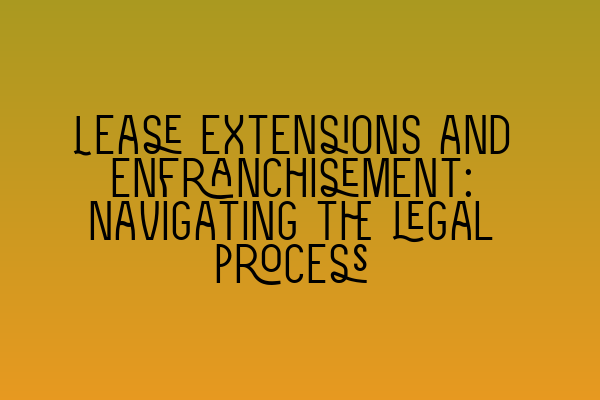Lease Extensions and Enfranchisement: Navigating the Legal Process
Are you a leaseholder looking to extend your lease or exercise your right to enfranchise? Navigating the legal process can be complex and daunting, but at SQE Property Law & Land Law, we are here to guide you every step of the way. We understand the importance of protecting your property rights and ensuring a fair outcome for all parties involved. In this blog post, we will explore the key aspects of lease extensions and enfranchisement, providing you with the information you need to make informed decisions.
Understanding Lease Extensions
A lease extension allows a leaseholder to extend the term of their lease beyond the original agreed-upon period. This is particularly relevant for those who own leasehold properties, such as flats or apartments. As the lease term decreases, the value of the property may also decrease, making it essential for leaseholders to consider extending their lease to maintain their investment.
When considering a lease extension, there are several factors to take into account. These include the remaining lease term, the ground rent payable, and the potential costs involved. It is crucial to seek professional advice to ensure you understand your rights and obligations as a leaseholder.
1. Understanding the Process:
The lease extension process involves several steps, starting with serving a Section 42 Notice on the freeholder. This notice notifies the freeholder of your intention to extend the lease and sets out the terms and conditions you propose. The freeholder then has a certain period within which to respond and either accept or propose alternative terms.
2. Valuing the Lease Extension:
One of the critical elements of lease extension is determining the premium payable to the freeholder for extending the lease. This premium is often based on factors such as the remaining lease term, the property’s value, and the ground rent payable. It is essential to obtain a professional valuation to ensure you are paying a fair price for the lease extension.
At SQE Property Law & Land Law, our team of expert surveyors and valuers can provide accurate and independent valuations for lease extensions, taking into account all relevant factors to ensure a fair outcome for our clients.
3. Negotiating the Terms:
Once the Section 42 Notice has been served and the premium has been calculated, negotiations may ensue between the leaseholder and the freeholder to agree on the final terms of the lease extension. This may involve discussions on the premium, the ground rent, and any other relevant terms such as repairing and maintenance responsibilities.
Our experienced solicitors at SQE Property Law & Land Law can provide invaluable assistance in negotiating these terms, ensuring your interests are protected throughout the process.
Enfranchisement: Exercising Your Rights
In addition to lease extensions, leaseholders may also have the right to enfranchise, which allows them to collectively purchase the freehold of their building or block of flats. This can provide added control over the management and maintenance of the property and can be an attractive option for leaseholders seeking greater autonomy.
1. Qualifying Criteria:
To exercise your right to enfranchise, certain qualifying criteria must be met. These criteria include a minimum number of leaseholders in the building, the length of time you have owned the leasehold, and the percentage of the building owned by qualifying leaseholders.
To determine whether you meet the qualifying criteria for enfranchisement, it is advisable to seek legal advice from our expert solicitors at SQE Property Law & Land Law.
2. Notifying the Freeholder:
Similar to lease extensions, the enfranchisement process begins by serving a formal notice on the freeholder. This is known as a Section 13 Notice and outlines the leaseholders’ intention to collectively purchase the freehold. The freeholder then has a specific period to respond and either agree to the proposed terms or propose alternatives.
3. Calculating the Premium:
As with lease extensions, the purchase price, or premium, for enfranchisement must be calculated. This is often based on factors such as the market value of the property, the ground rents payable, and any other relevant considerations. Accurate valuation and negotiation are crucial to ensure a fair and reasonable premium.
At SQE Property Law & Land Law, we have a team of experts who specialize in enfranchisement matters, including surveyors, valuers, and solicitors. Our integrated approach ensures a seamless and efficient process, with all aspects of the enfranchisement handled by our experienced professionals.
Conclusion
Lease extensions and enfranchisement are complex legal processes that require expert guidance to navigate successfully. At SQE Property Law & Land Law, we understand the intricacies of these matters and are committed to providing our clients with comprehensive advice and support.
Whether you are a leaseholder seeking to extend your lease or a group of leaseholders looking to enfranchise, our team of solicitors, surveyors, and valuers can assist you every step of the way. We prioritize your interests and work tirelessly to achieve a favorable outcome.
To learn more about lease extensions, enfranchisement, or any other property law matters, please contact us today or visit our related articles:
- SQE 1 Practice Exam Questions
- SQE 1 Practice Mocks FLK1 FLK2
- SQE 2 Preparation Courses
- SQE 1 Preparation Courses
- SRA SQE Exam Dates
Our team at SQE Property Law & Land Law is here to help you make informed decisions and achieve the best outcomes for your property interests.
